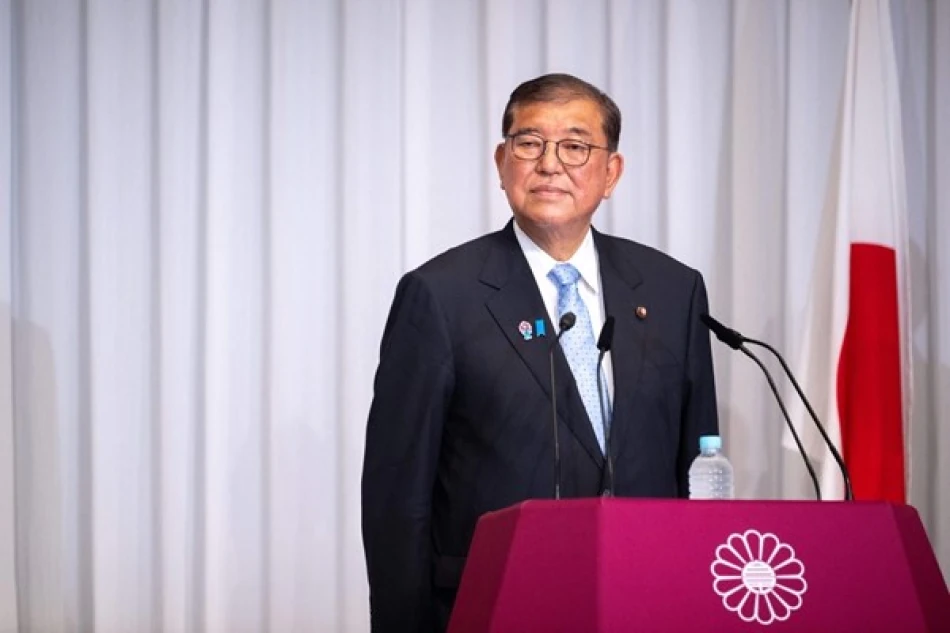
Japanese PM Abe Resigns Unexpectedly, Shocking the Nation
Japan's Political Upheaval: PM Ishiba's Resignation Sets Stage for Economic Policy Shift
Japanese Prime Minister Shigeru Ishiba has decided to resign to prevent further fractures within the ruling Liberal Democratic Party (LDP), according to Japan's national broadcaster NHK. The move comes after his coalition lost its majority in the House of Councillors during July elections, creating political uncertainty in the world's third-largest economy at a critical juncture for monetary policy and international trade relations.
The Political Calculus Behind the Resignation
Ishiba's decision reflects the harsh realities of Japanese coalition politics, where maintaining party unity often takes precedence over individual leadership ambitions. The LDP has governed Japan almost continuously since 1955, making internal cohesion crucial for maintaining its grip on power. By stepping aside, Ishiba appears to be following the traditional Japanese political playbook of sacrificing personal position for party stability.
The loss of the coalition's majority in the House of Councillors—Japan's upper house—significantly weakens the government's ability to pass legislation smoothly. This political gridlock comes at a particularly challenging time, as Japan grapples with persistent inflation, an aging population, and mounting pressure to increase defense spending amid regional security tensions.
Economic Implications and Market Reactions
Political instability in Japan typically triggers cautious responses from international investors, particularly given the country's outsized role in global supply chains and its position as a major creditor nation. The yen's performance and Japanese government bond yields often reflect market confidence in the ruling coalition's ability to maintain economic stability.
For the Bank of Japan, political uncertainty complicates an already delicate monetary policy environment. The central bank has been gradually unwinding decades of ultra-loose monetary policy, but political upheaval could delay or alter the pace of these adjustments. Currency traders and bond investors will be watching closely for signals about the next government's fiscal priorities and its relationship with the central bank's independence.
Historical Context and Precedent
Japan has experienced frequent leadership changes, particularly during periods of economic stress or political scandal. The country saw six different prime ministers between 2006 and 2012, a period marked by economic stagnation and natural disasters. However, the subsequent tenure of Shinzo Abe from 2012 to 2020 demonstrated how stable leadership can provide a foundation for consistent economic policy, including the famous "Abenomics" stimulus program.
Ishiba's resignation follows a pattern where Japanese prime ministers often step down when their approval ratings decline or when they face significant political opposition, even if they retain formal power. This contrasts sharply with political cultures in countries like the United States or United Kingdom, where leaders more commonly fight to retain office despite political setbacks.
What Comes Next for Japan's Leadership
The LDP will now need to select a new party leader who can unite the various factions within the party while appealing to voters ahead of future elections. The choice will likely focus on candidates who can balance the party's traditional conservative base with younger voters increasingly concerned about economic opportunities and social issues.
Potential successors will need to address Japan's mounting challenges: revitalizing economic growth, managing relationships with China and North Korea, strengthening ties with allies like the United States, and implementing structural reforms to address demographic decline. The new leader's approach to these issues will have significant implications for regional stability and global economic trends.
For international observers, Japan's leadership transition represents both risk and opportunity. While political uncertainty may create short-term market volatility, it also opens the door for fresh policy approaches that could reinvigorate Japan's economic performance and strengthen its role in addressing regional security challenges.
Most Viewed News

 Layla Al Mansoori
Layla Al Mansoori






